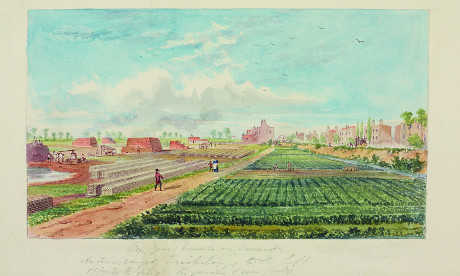Hackney author looks at the gardens of the British working class

C.H. Mathews, watercolour of Kingsland Road, 1852. Credit: London Metropolitan Archives and City of London
In 1939, the Nurseyman and Seedsman magazine claimed that: “We have been called a nation of shopkeepers; we might with equal justice be called a nation of gardeners.”
Considering the UK’s current housing crisis (the Joseph Rowntree Foundation predicts a shortage of one million homes nationwide by 2022) this paraphrasing of a saying made famous by Napoleon seems a quaint remnant of a bygone era.
But for author Margaret Willes the idea of a “nation of gardeners” still rings true. In her latest book The Gardens of the British Working Class, the Hackney-based author unearths a rich and vibrant ‘people’s history’ of working-class Britain through its gardens and gardening.
Spanning over four centuries, the book reveals how even the privations of the Industrial Revolution and challenges of living in high-rise accommodation could not snuff out the desire to cultivate the soil.
“It requires a bit of imagination really. You don’t always have to have a garden, it can be a balcony, a window box, raised beds or a communal area.” says Willes.
Many gardeners, at least prior to the twentieth century, were not literate, which made researching the book all the trickier. But as a result the stories of unknown individuals who tended plots in straitened circumstances are fresh, brought to life by Willes’ lively prose style.
Among tales of forgotten gardeners we learn of Archibald M’Naughton, a journeyman who came to London in 1777, moving to Hackney “on account of the air” where he eked out a living laying out new gardens.
By the mid-nineteenth century, industrial pollution and overcrowding was prevalent in Hackney, but Willes points out that amid fever and squalor horticulture survived and even thrived.
A passage describing Whiskers’ Gardens near Hackney Road in 1848 as a “horticultural island” serves as a reminder that ambitions of self-sufficiency exist outside the twentieth century allotment boom.
Willes, now retired, is a former publisher at the National Trust and a trustee of the Hackney Society. Although encompassing the entire UK, Willes’ book provides fascinating nuggets of East End history in particular. Not least is a section describing how Victoria Park was founded to relieve the densely populated East End and halt the spread of epidemics.
From her home in Dalston, Willes says she has withdrawal symptoms, following two and a half years spent researching and writing her book. But having surveyed four centuries-worth of gardens and people with green fingers, how does she see the future of gardening?
“As we get more and more overcrowded the idea of having a garden is diminishing, but there are many kinds of community garden schemes springing up,” she says, citing initiatives such as Growing Communities in Hackney and the Edible Bus Stop in Brixton.
Willes describes herself as “lucky” to live in a Hackney property with a garden, but with the book finished she can now at least spend more time tending it.
“We have a huge apple tree which is really old and i’m longing for someone to come and prune it for me,” she admits.
The Gardens of the British Working Class is published by Yale University Press. RRP: £25. ISBN: 9780300187847
